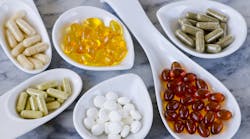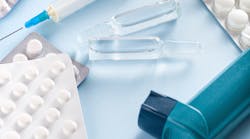Why patient self-medication with dietary supplements matters to dental hygienists
Dietary supplements are intended to add to, or supplement, the diet and are different from conventional food. While dietary supplements may help improve or maintain overall health, they’re not intended to treat a specific disease and cannot be labeled as such. Even if a product is labeled as a “dietary supplement,” if it is intended to treat, prevent, cure, or alleviate the symptoms of a disease, it is considered a drug, and as such is subject to all FDA requirements that apply to drugs.1
The Federal Food, Drug, and Cosmetic Act was amended by the Dietary Supplement Health and Education Act, which defined "dietary supplement" and set out the FDA's authority regarding such products. Under existing law, the FDA does not have the authority to approve dietary supplements for safety and effectiveness before the supplements are sold to the public. It is actually the responsibility of the supplements’ manufacturer to ensure that their products meet the safety standards for dietary supplements and are not otherwise in violation of the law.1 However, often this lack of oversight leads to lack of standardization and consistency in doses.
Since manufacturers of dietary supplements may introduce a dietary supplement to the market without notifying the FDA, the agency's role in regulating supplements primarily begins after the product enters the marketplace. The FDA periodically inspects dietary supplement manufacturing facilities, reviews product labels and other labeling information, and monitors adverse event reports. If a product is found to be unsafe, the FDA can work with the company to bring the product into compliance, ask the company to voluntarily recall the product, or take action to remove a dangerous product from the market.1
Why does this matter to dental hygienists?
Patients may combine dietary supplements and medications, with the thought that the combination is more effective than either agent on its own. In addition, patients may self-medicate with dietary supplements to alleviate side effects from medications, or ironically, other dietary supplements. Patients may also use dietary supplements to treat the symptoms of a much more serious underlying condition. Many patients do not disclose their use of supplements because they think it is unnecessary. This underscores the importance of dental hygienists getting a complete and accurate medical history at every appointment to help patients avoid potential interactions between dietary supplements and medications and to ensure that patients seek medical care when it is indicated.
A study published in 2008 found that only five supplements with a potential for clinically significant drug interaction—garlic, ginkgo, kava, St. John's wort, and valerian—accounted for 68% of the potential clinically significant interactions. In addition, this study also found that only four classes of medications with a potential for interaction (antithrombotic medications, sedatives, antidepressant agents, and antidiabetic agents) accounted for 94% of the potential clinically significant interactions with dietary supplements.2 However, lack of evidence or documentation of a drug-supplement interaction does not necessarily mean that no interaction will take place, since research in this area is lacking.
Some possible interactions
We can sometimes predict likely interactions between dietary supplements.3 Dietary supplements may interact with drugs and other supplements via alteration of cytochrome P450 enzyme systems, resulting in altered hepatic metabolism and either increased or decreased bioavailability of other drugs.3,4 For example, black cohosh is an inhibitor of the cytochrome enzyme CYP2D6. As such, it may increase the blood levels and efficacy of several medications metabolized by that enzyme, including codeine, metoprolol, and tramadol.5 Kava is an inhibitor of the cytochrome enzyme CYP1A2. As such, it may increase the blood levels and efficacy of several medications, including diazepam, propranolol, and warfarin.5 St. John’s wort is an inducer of the cytochrome enzyme CYP3A4. As such, it may decrease the blood levels and efficacy of many medications, including carbamazepine (Tegretol), clindamycin, dexamethasone, fentanyl, hydrocodone, lidocaine, oxycodone, and prednisone.6
Another way medications interact is through combination of their pharmacologic effects. For example, many dietary supplements have been associated with platelet aggregation inhibition. The dietary supplements that have been most associated with this effect include garlic, gingko, ginger, ginseng, glucosamine, and evening primrose oil. Thus, these supplements may increase the risk of serious bleeding events when used concomitantly with antiplatelet medications and anticoagulant medications.7-9 Valerian is a CNS depressant and may result in additive CNS depression when used concomitantly with antihistamines, benzodiazepines, opioids, and antidepressants.10
Many patients do not disclose their use of supplements because they don’t realize it’s necessary. Since patients may use dietary supplements to self-medicate, they may be at risk for drug-supplement interactions as well as the progression of undiagnosed disease. Dental hygienists can help ensure patients’ safety by obtaining a complete and accurate medical history at every appointment. Although studies have shown that there are relatively few drug-supplement interactions that are clinically significant, lack of evidence doesn’t necessarily mean an interaction won’t happen.
Editor's note: This article appeared in the January/February 2023 print edition of RDH magazine. Dental hygienists in North America are eligible for a complimentary print subscription. Sign up here.
References
- Questions and answers on dietary supplements. US Food & Drug Administration. Accessed November 1, 2022. https://www.fda.gov/food/information-consumers-using-dietary-supplements/questions-and-answers-dietary-supplements
- Sood A, Sood R, Brinker FJ, Mann R, Loehrer LL, Wahner-Roedler DL. Potential for interactions between dietary supplements and prescription medications. Am J Med. 2008;121(3):207-211. doi:10.1016/j.amjmed.2007.11.014
- Gurley BJ, Gardner SF, Hubbard MA, et al. Cytochrome P450 phenotypic ratios for predicting herb-drug interactions in humans. Clin Pharmacol Ther. 2002;72(3):276-287. doi:10.1067/mcp.2002.126913
- Foster BC, Vandenhoek S, Hana J, et al. In vitro inhibition of human cytochrome P450-mediated metabolism of marker substrates by natural products. Phytomed. 2003;10(4):334-342. doi:10.1078/0944711033220048393
- Gurley BJ, Gardner SF, Hubbard MA, et al. In vivo effects of goldenseal, kava kava, black cohosh, and valerian on human cytochrome P450 1A2, 2D6, 2E1, and 3A4/5 phenotypes. Clin Pharmacol Ther. 2005;77:415-426. doi:10.1016/j.clpt.2005.01.009
- Markowitz JS, Donovan JL, DeVane CL, et al. Effect of St John’s wort on drug metabolism by induction of cytochrome P450 3A4 enzyme. J Am Dent Assoc. 2003;290:1500-4. doi:10.1001/jama.290.11.1500
- Rahman K, Billington D. Dietary supplementation with aged garlic extract inhibits ADP-induced platelet aggregation in humans. J Nutr. 2000;130:2662-5. doi:10.1093/jn/130.11.2662
- Beckert BW, Concannon MJ, Henry SL, Smith DS, Puckett CL. The effect of herbal medicines on platelet function: an in vivo experiment and review of the literature. Plast Reconstr Surg. 2007;120(7):2044-2050. doi:10.1097/01.prs.0000295972.18570.0b
- Knudsen JF, Sokol GH. Potential glucosamine-warfarin interaction resulting in increased international normalized ratio: case report and review of the literature and MedWatch database. Pharmacotherapy. 2008;28:540-548. doi:10.1592/phco.28.4.540
- Houghton PJ. The scientific basis for the reputed activity of Valerian. J Pharm Pharmacol. 1999;51:505-512. doi:10.1211/0022357991772772








